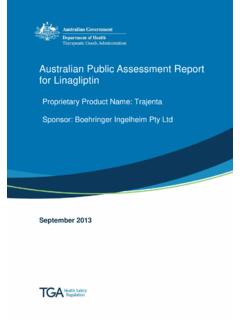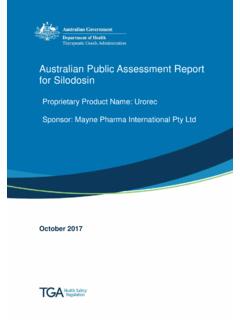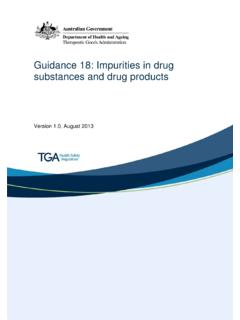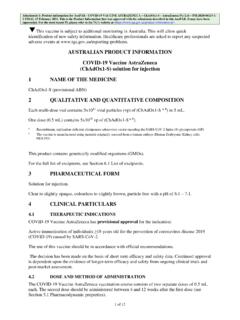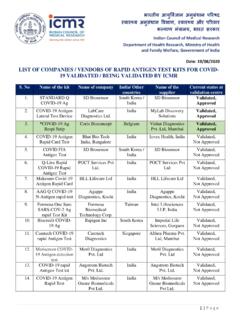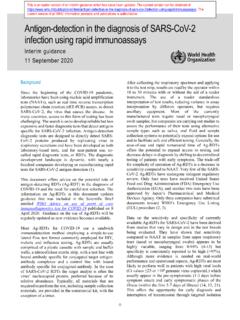Transcription of COVID-19 Antigen Rapid Test Substance Concentration ...
1 1/6 2/6 3/6 COVID-19 Antigen Rapid Test (For Self-testing) English Scan me for the how to use video For further support call +61 2 9986 2252 For additional language instructions please visit ISCOVu002-B001 1 ISCOVu002-B003 3 ISCOVu002-B005 5 Please read these instructions for use before undertaking a test. [Intended use] The COVID-19 Antigen Rapid Test is a lateral flow immunoassay intended for the qualitative detection of SARS-CoV-2 nucleocapsid antigens in nasal swabs from individuals suspected of being infected with COVID-19 within the first 7 days of symptom onset. This test is intended for self-use by persons aged 15 years or above and also for an adult testing another person under 15 years of age. Individuals over 65 years of age should consider to seek assistance in performing the test.
2 The test is an aid for diagnosis of COVID-19 and only provides a presumptive screening test result for the SARS-CoV-2 virus. It is intended to be used in the home or similar environment by a lay person. Confirmation of positive results is required by contacting your State or Territory Coronavirus testing services to get a laboratory PCR test. A negative result does not mean a person does not have COVID-19 . If you have symptoms, you should have a laboratory PCR test and follow medical advice. [When to use the test kit] Use this test: If you have COVID-like symptoms including headache, fever, a cough, sore throat, loss of sense of smell or taste, shortness of breath, etc. If you are concerned that you have been exposed to COVID-19 . Do not use this test: X If you are prone to nosebleeds.
3 [Warnings and precautions] 1. For in vitro diagnostic use only. 2. Do not use this test as the only guide to manage your illness. Please contact your State or Territory Coronavirus testing services to get a laboratory PCR test if your symptoms are persisting or worsening, or if you are concerned at any time. 3. The test is less reliable in the later phase of infection and in asymptomatic individuals. 4. Negative results may occur if testing is not performed within the first 7 days of symptom onset. 5. If the test is to be used on a person under 15 years of age, the test must be undertaken by an adult. 6. Keep out of reach of children to reduce the risk of accidentally drinking the extraction reagent or swallowing small parts. 7. Do not use this product after the expiration date.
4 8. Only use the test once and only with the provided parts. 9. Do not undertake testing in direct sunlight. 10. Avoid contact with Extraction Reagent. If the extraction reagent is accidentally exposed to a person s skin or eye, rinse with plenty of running water immediately. If irritation persists, seek medical assistance. 11. This test involves taking a sample from deep inside your nose. When doing the test, pay particular attention to the instructions on how to swab your nose. Incorrect swabbing may lead to an inaccurate test result. 12. The test cassette should remain in the sealed pouch until use. 13. Wash hands thoroughly before and after testing. 14. Dispose all parts of the used test kit into the waste bag, then discard the waste bag in the general waste. [What is included in the test kit] Components ISCOVu002-B001 ISCOVu002-B003 ISCOVu002-B005 1.
5 Test Cassette 1x 3x 5x 2. Extraction Reagent Tube 1x 3x 5x 3. Swab 1x 3x 5x 4. Waste Bag 1x 3x 5x 5. Instructions for Use 1x 1x 1x [Storage and stability] Store as packaged in the sealed pouch between 4 30 C. The LOT and the expiration date were printed on the foil packaging and box. [Limitations] 1. The test should be used for the qualitative detection of SARS-CoV-2 antigens in nasal swab specimens only. The intensity of the T-line does not necessarily correlate to SARS-CoV-2 viral titer in the specimen. 2. Failure to follow the instructions for use may adversely affect test performance and/or invalidate the test result. 3. The test is a presumptive test only. If you get a positive result, you must immediately seek a laboratory PCR test and follow-up clinical care.
6 4. Negative results may occur if the level of Antigen in the specimen is below the detection limit of the test. Repeat testing after 1-2 days is recommended, if there is an ongoing suspicion of infection, being in a high risk setting or where there is an occupational risk or have a known exposure to COVID-19 . 5. Negative results do not rule out SARS-CoV-2 infection, if you are experiencing COVID-like symptoms, you must immediately seek further laboratory PCR testing. 6. A Negative result does not rule out infection with another type of respiratory virus. 7. A Positive result cannot determine whether a person is infectious. 8. Positive results do not rule out co-infections with other pathogens. 9. Positive results may occur, particularly in areas with low numbers of COVID-19 infections and confirmation with a PCR testing should be considered.
7 [Frequently asked questions (FAQ)] How does the CLUNGENE COVID-19 Antigen Rapid Test work? The CLUNGENE COVID-19 Antigen Rapid Test is a type of test called an Antigen test. When you have COVID-19 , the SARS-CoV-2 virus (the virus that causes COVID-19 ) can be present in your nasal secretions. The CLUNGENE COVID-19 Antigen Rapid Test can detect small parts of SARS-CoV-2 virus in your nasal secretions. These small parts of the SARS-CoV-2 virus are known as proteins or antigens. Will this test hurt? No, the nasal swab is not sharp and it should not hurt. Sometimes the swab can feel slightly uncomfortable or tickly. If you feel pain, please stop the test and seek advice from a doctor. What are the potential benefits and risks of this test? Potential risks include: Possible discomfort during sample collection.
8 Possible incorrect test results (see Limitations section). Potential benefits include: The results, along with other information, can help your doctor make informed recommendations about your treatment/care. The results of this test may help limit the spread of COVID-19 to your family and others in your community. What is the difference between a COVID-19 Antigen , molecular, and antibody test? There are different kinds of tests for COVID-19 . Molecular tests (also known as PCR tests) detect genetic material from the virus. Antigen tests detect proteins from the virus. Antigen tests are very specific for the virus, but are not as sensitive as molecular tests. This means that a positive result is highly accurate, but a negative result does not rule out infection. Another type of test is an antibody test.
9 A COVID-19 antibody test detects antibodies that have been made by your immune system in response to a previous COVID-19 infection. Antibody tests are not suitable to diagnose an active COVID-19 infection. [Performance characteristics] Clinical Performance The clinical performance of CLUNGENE COVID-19 Antigen Rapid Test for self-testing was evaluated in a prospective study in Greece between June 2021 and July 2021. A total of 578 laypersons (of which, 122 within 7 days post symptom onset) were sequentially enrolled. No additional training or instructions were provided. Self-sampling with nasal swabs and self-testing were conducted by participants using the COVID-19 Antigen Rapid Test. For comparison, to each of the participants, an RT-PCR testing was performed by professional sampling with nasopharyngeal swab.
10 The COVID-19 Antigen Rapid Test showed a sensitivity of (95% confidence interval: , N=122) and a specificity of 100% (95% confidence interval: , N=456) compared to RT-PCR. Limit of Detection (Analytical Sensitivity) The COVID-19 Antigen Rapid Test can detect SARS-CoV-2 virus as low as 570 TCID50/mL. Variants The performance of COVID-19 Antigen Rapid Test is not affected by Alpha, Beta, Gamma, Delta variants. Cross Reactivity (Analytical Specificity) Cross reactivity was evaluated by testing 32 potential cross-reactive substances that may be present in the nasal cavity. No cross-reactivity was observed with recombinant MERS-CoV nucleocapsid protein when tested at the Concentration of 50 g/mL. No cross-reactivity was observed with the following viruses when tested at the Concentration of 106 PFU/mL: Influenza A (H1N1), Influenza A (H1N1pdm09), Influenza A (H3N2), Influenza B (Yamagata), Influenza B (Victoria), Adenovirus (type 1, 2, 3, 5, 7, 55), Human metapneumovirus, Parainfluenza virus (type 1, 2, 3, 4), Respiratory syncytial virus, Enterovirus, Rhinovirus, Human coronavirus 229E, Human coronavirus OC43, Human coronavirus NL63, Human coronavirus HKU1.


